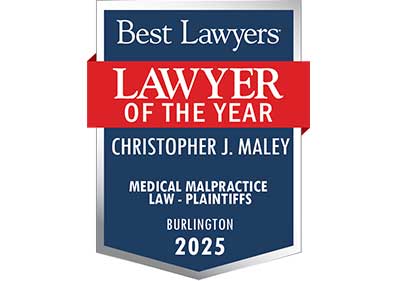Selected:
Lawyer of the Year
Medical Malpractice Law
Burlington - 2025
Vermont medical malpractice lawyer Chris Maley has a long history of representing individuals in the area of medical malpractice, and regularly represents patients who have been injured, or the families of those who have died as a result of the negligence of medical professionals and healthcare providers — including such complex cases as birth injuries leading to cerebral palsy and other disabilities.

Chris has received recognition by his peers in this area of law. Most notably, Best Lawyers® lists him in the 2025 edition of The Best Lawyers in America® in the area of medical malpractice plaintiffs law. He has received the additional honor of being named as Best Lawyers® "Lawyer of the Year" for Medical Malpractice - Burlington, Vermont in the 2025, 2024, 2022, 2018 and 2015 edition of Best Lawyers.
Additionally, Best Law Firms has again ranked Maley and Maley as a Burlington Tier One Law Firm in the area of Medical Malpractice Law in its 2025 edition of Best Law Firms.
Examples of Medical Malpractice Cases We Handle
Maley and Maley has resolved many claims involving a wide variety of medical malpractice lawsuits including hospital and obstetrical malpractice resulting in cerebral palsy. These include:
- Failure to diagnose and treat: Resolved a medical malpractice case involving the alleged failure to appropriately diagnose and treat a 42-year-old woman's severe lower extremity injury resulting in catastrophic harm for in excess of three and a half million dollars.
- Delay in diagnosis of cancer: Recovered $2,375,000.00 in a medical malpractice lawsuit involving the negligent delay in diagnosis of prostate cancer.
- Negligent discharge: Settled for an undisclosed amount, a medical malpractice lawsuit alleging that a six-month old boy was negligently discharged from an emergency department resulting in brain damage, blindness, cerebral palsy, and ultimately death two and a half years later.
- Failure to monitor: Won a jury verdict for $800,000.00 in a medical malpractice wrongful death case involving the failure to monitor a patient on Coumadin.
Other examples of medical malpractice cases Maley and Maley has handled include:
- Failure to diagnose cancer (colon cancer, breast cancer, lung cancer, etc.)
- Anesthesia and medication errors
- Overdoses
- Negligent monitoring
- Negligent emergency room care
- Surgical errors
- Birth injuries resulting in brain damage and cerebral palsy, and
- Negligent nursing care.
Medical malpractice cases are extremely complex and, therefore, require attorneys with demonstrated skill and experience in that area.
An experienced medical malpractice lawyer, Chris works closely with some of the most knowledgeable and renowned medical experts in the country, and has a strong record of obtaining significant recoveries on behalf of victims of medical malpractice.
Please contact Chris by email or call collect at (802) 489-5258 for a free initial consultation and case evaluation .
Filing a Medical Malpractice Claim in Vermont
Most bad outcomes, deaths or injuries in the setting of medical care are not the result of medical negligence. The vast majority of doctors, nurses and other care providers are competent and diligent professionals. Only those instances when a medical professional fails to do what is expected of an average professional and a serious injury results is there potential for a claim.
Where to Begin
Generally, attempting to evaluate and resolve a medical malpractice claim on your own is not recommended. The doctor is rarely the person authorized to settle a case. Risk management departments, insurance company representatives, and the doctor's attorney are ordinarily the decision makers as to whether compensation should be offered. The loyalty of such individuals is with the physicians, nurses, and hospitals they represent. In most cases, their evaluations are geared to encourage you not to pursue an action or to resolve the case for the smallest figure possible. In almost all cases, you need an experienced medical malpractice lawyer to help you evaluate and prosecute your claim.
Statute of Limitations for Medical Malpractice Claims
When considering whether to pursue a medical malpractice claim, you must be aware that time is of the essence. These cases are by their nature complex and generally require several months of evaluation prior to deciding whether to file a lawsuit.
Generally, the statute of limitations for medical malpractice cases in Vermont requires that the claim be brought within three years from the date of the conduct giving rise to the claim. 12 V.S.A. S 521. This means a lawsuit must be filed within three years or the right to recovery is barred. However, there are significant exceptions to these laws. For example, where the action is based upon the discovery of a foreign object in the patient's body, which is not discovered within the three year period, the action may be commenced within two years of the date of the discovery of the foreign object. There are other situations where the three-year period may be extended.
Consultation with an attorney regarding the nuances of the applicable statute of limitations is important. Generally, the time periods do not begin to run until the injured party has or should have discovered her injury and the fact that it may have been caused by defendant's negligence.
Obtaining an Expert Opinion
After obtaining and reviewing the relevant medical records, Maley and Maley can make the determination as to whether there is a potential claim warranting an expert review of the medical records. With very few exceptions, for a medical malpractice claim to be viable, expert testimony of a physician is required. Experts in the appropriate specialty may opine as to whether the physician departed from the standard of care of reasonably skillful physician within that specialty under the same or similar circumstances. Experts may also offer opinions as to whether the negligence of the physician was the proximate cause of physical and emotional harm. Most cases require experts from multiple specialties. Unless Maley and Maley is able to obtain the appropriate expert medical opinions from qualified and respected physicians, your case will not be pursued.
File a Medical Malpractice Lawsuit
If Maley and Maley is able to obtain favorable expert opinions, and Chris believes your claim is legitimate, he may attempt to negotiate a settlement without filing a lawsuit. However, few medical malpractice cases resolve in this manner. Most require that a lawsuit be filed and most take several months, and more often two to three years to resolve. The insurance companies must thoroughly evaluate the claim, including seeking their own expert opinions, prior to making a determination as to whether to offer compensation to settle the case. If the defendant does not make a reasonable settlement offer, a trial will be necessary.
Professional Referrals in the Area of Medical Malpractice
Maley and Maley receives many medical malpractice referrals from other attorneys both inside and outside of Vermont, and provide referral fees to referring attorneys within the statutes and ethical guidelines of Vermont and their respective states. Attorneys refer medical malpractice cases to Maley and Maley for a variety of reasons including matters in which the firm has particular experience, matters that require extensive commitment of time and resources, or cases that present complex or unusual legal issues. If you are an attorney considering referring a potential case, please feel free to call (802) 489-5258 or contact Chris by email.
Vermont Medical Malpractice Law
Medical Negligence
In an action for medical malpractice, otherwise known as medical negligence, the plaintiff has the burden of proving the applicable "standard of care." In Vermont, the standard of care is defined as: "The degree of care ordinarily exercised by a reasonably skillful, careful, and prudent health care professional engaged in a similar practice under the same or similar circumstances whether or not within the State of Vermont." 12 V.S.A. § 1908. The law imposes an objective standard, and measures the defendant doctor's conduct against that of a reasonable doctor. The plaintiff must also prove the defendant physician breached that standard, and that as a proximate result the plaintiff suffered injuries that would not have otherwise occurred. Negligence and causation must be established by a "preponderance of the evidence," or within a "reasonable degree of certainty" or to a "reasonable medical probability." These phrases mean "more likely than not," or greater than a fifty percent likelihood. Medical negligence claimants must offer expert testimony with respect to the applicable standard of care, the breach of the standard of care, and the causal link between the negligence and the harm sustained.
Failure To Obtain Informed Consent
Patients must be informed of the significant risks and benefits of a course of treatment. Failure to do so may give rise to a cause of action called failure to obtain informed consent. The Vermont statute on informed consent only requires doctors to disclose those risks and alternatives that "a reasonable medical practitioner under similar circumstances would have disclosed." 12 V.S.A. § 1909. Vermont law defines "lack of informed consent" as: "The failure of the person providing the professional treatment or diagnosis to disclose to the patient such alternatives thereto and the reasonably foreseeable risks and benefits involved as a reasonable medical practitioner under similar circumstances would have disclosed, in a manner permitting the patient to make a knowledgeable evaluation." 12 V.S.A. § 1909.
Statutes Of Limitation - Medical Malpractice
Generally, the statutes of limitations in Vermont require that personal injury and medical malpractice claims be brought within three years from the conduct giving rise to the claim, but there are significant exceptions to these laws. 12 V.S.A. § 512(4), 12 V.S.A. § 521, and 12 V.S.A. § 551. Consultation with an attorney regarding the nuances of the applicable statute of limitations is important. Generally, the time periods do not begin to run until the injured party has or should have discovered her injury and the fact that it may have been caused by defendant's negligence. 12 V.S.A. § 521. Potential medical malpractice claims take a long time to appropriately evaluate to determine whether a claim should be pursued. Therefore, it is advisable to contact an attorney as soon as possible so that time limitations do not prevent you or your family member from pursuing an otherwise meritorious claim.
Helpful Medical Malpractice Related Web Resources
- National Conference of State Legislatures - Vermont medical liability/medical malpractice laws summarized
- YourSurgery.com - Easy to understand information on surgeries
- WebMD - General medical information
- Vermont Department of Health
- United Cerebral Palsy
- March of Dimes
- New England Journal of Medicine
- BreastCancer.org
- National Cancer Institute
- American Cancer Society
- Pub Med
- Merck Manuals
- American Heart Association
- American Board of Medical Specialties
- Physicians Desk Reference
- E-Medicine.com


